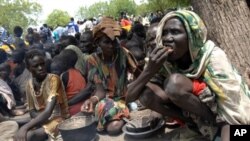A top official of the United Nations Mission in Sudan (UNMIS) says the world body works closely with both local and international non-governmental organizations (NGO’s) to provide various forms of assistance to Sudan.
UNMIS is also helping to facilitate the upcoming elections scheduled for April 11-13.
Khalid Mansour, UNMIS Director of Public Information, said “[non-governmental organizations are the ones which] at the end of the day deliver the assistance ….Some of them are international and many of them are national… So indeed we do work with hundreds of NGO’s be that in Southern Sudan or in Darfur and definitely in other parts of Sudan.”
Electoral challenges
UNMIS is also delivering electoral support. Its Electoral Assistance Division [EAD] was created to help meet the Security Council mandate for UNMIS “to support the preparations for and conduct of elections and referenda provided for by the Comprehensive Peace Agreement” signed between the north and south in 2006.
Keeping the peace
Elections need an enabling environment, and UNMIS has been working with international and local NGOs to ensure tranquility – and stability –needed for the task. Specifically, they have worked to provide humanitarian assistance and promote human rights.
“If you are in [a camp for internally displaced people across Darfur’s three states]… where you see the UN people providing services, “ said UNMIS spokesman Khalid Mansour, “you will have a better understanding of what [we] do and what [we] stand for.”
In Darfur, UNMIS consists of over 17,000 military personnel and over 3,000 civilian police personnel.
[http://www.un.org/en/peacekeeping/missions/unmis/background.shtml]
Mansour said the UN body has taken steps to address the concerns and consider suggestions of the Sudanese under its protection.
“Of course, we are not perfect, and we can never claim to be that. So, sometimes people are unhappy with not enough services or not enough assistance or sometimes people complain that we are not neutral. We take all such complaints or comments very, very seriously, and we look out for them because this is the only way that we can improve our work,” Mansour said.




